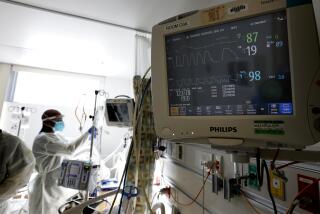Cost-Sharing Cuts Visits to Doctors : Poor’s Health Hurt by Paying Part of Care, Study Finds
Requiring patients to pay a portion of doctor bills will cut medical costs, but it will hurt the poor, a study to be released today says.
The cost-sharing approach, tested recently with a large group of patients from around the country, resulted in one-third fewer visits to the doctor for minor ailments, according to the study, which was conducted by a group of California researchers.
That would seem to be good news for health planners trying to cut medical costs, particularly in light of the study’s other finding that such reductions seem to have had no adverse effects on well-to-do and middle-income patients.
However as predicted by critics of such approaches, seeing a doctor less frequently had serious health consequences for the poor, the study found.
Poor and Uneducated
Writing in today’s Annals of Internal Medicine, the researchers, who are from the Rand Corp. and UCLA’s Medical School, say poor and uneducated people who began the study in poor health and had to pay their medical bills did not fare as well as similar participants who got free care.
Specifically, the study found that 34% of those in the needy group who were in poor health reported serious symptoms at the beginning of the study. The percentage declined during the study, both for those who received free care and those who had to pay some of their bills, probably because the study gave participants access to medical care that some had not had before, the researchers said.
However, complaints among those who got free care fell to 24%, compared to 29% for those who had to pay.
Many government officials would like to extend this “co-insurance” or “cost-sharing” approach to government health programs for the needy, but there is a danger in doing this, the researchers said.
Not Equally Shared
“Making patients pay part of the cost of care is an effective policy for reducing medical expenditures,” the researchers wrote. “However, our results suggest that there may be health consequences of such a policy that are not shared equally across disadvantaged and non-disadvantaged groups.”
In an interview Tuesday, Dr. Martin F. Shapiro, an assistant professor of medicine at UCLA and the chief author of the study, warned, “When you put barriers in the way of the poor, you’re putting them at risk.”
In contrast to the poor, patients of high socioeconomic status who entered the experiment in poor health did not benefit from free health care nor were they harmed by being required to pay a portion of their medical bills, even if their symptoms were serious, the study found.
As a result of these somewhat contradictory findings, the study concluded, proponents of the so-called cost-sharing medical plans should consider carefully the clinical and social repercussions of the plans before applying them across the board to all patients.
The study, “The Effects of Cost Sharing on Seeking Care for Serious and Minor Symptoms,” was based on questionnaires to 3,539 people, ages 17 to 61, who had been randomly assigned either to a free-care plan or to cost-sharing insurance plans from 1975 to 1980.
Sponsored by the U.S. Department of Health and Human Services, the cost-sharing study is part of one of the largest projects of its kind ever undertaken. A 1981 report from the project showed that the cost of health care for people who are fully covered by insurance is 50% greater than for people who pay part of their bills out of pocket. That study, however, did not tell what the effect of seeing a doctor less frequently would have on the health of groups that pay for part of the health costs.






